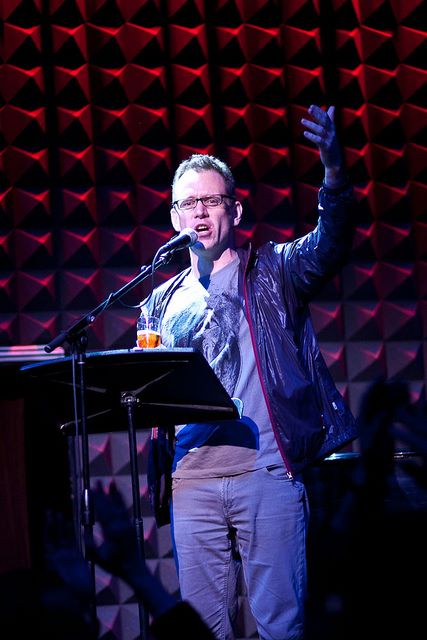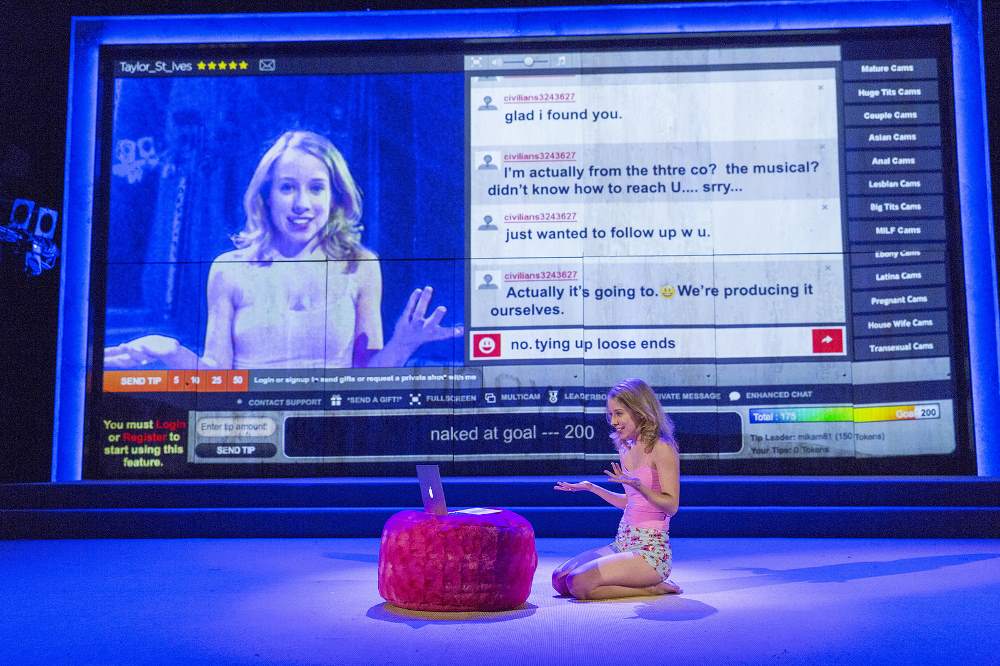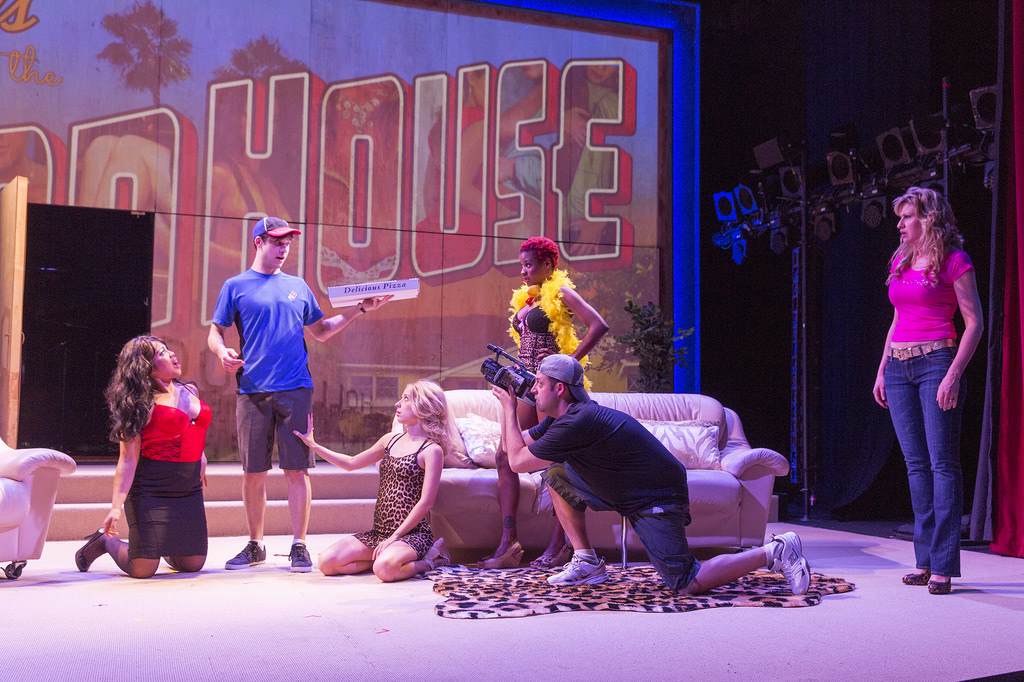NEW YORK CITY: Some kids dream of becoming doctors, astronauts or archaeologists. But 18-year-old Becky dreams of becoming a porn star. At least, that’s the concept of Pretty Filthy, a new musical based on interviews with players in the Southern California porn industry from documentary theatre troupe the Civilians.
Pretty Filthy follows Becky as she moves from an unnamed Midwestern town to Los Angeles to follow her dream. There she meets a colorful cast of characters, including a rep for a talent agency called Girls-R-Us, a man whose talented hands are insured for $2 million each and a dominatrix who “buy[s] bullwhips the way women buy shoes.”
“She’s sort of the white rabbit that we follow down the rabbit hole into this magical world,” says Civilians founder/artistic director Steve Cosson, who directed Pretty Filthy. It’s not Wonderland for kids, to be sure, although instead of nudity and NSFW images, the show is full of suggestive songs (composed by Michael Friedman, with a book by Bess Wohl) and fake orgasms. This is a musical in which the refrain of the “I want song” goes, “I’m gonna fuck the world!”
The musical was commissioned by Center Theatre Group in Los Angeles, and is currently running at Abrons Arts Center through March 1. Aside from the prurient jokes, the musical also explores the human side of porn, and how the industry has changed in the last 10 years. And it addresses the perennial quandary of sex workers: When sex becomes your job, does it feel like work in your off-hours?
As part of their research, the Civilians spent two months interviewing a bevy of performers, directors and producers of such companies as Hustler and Vivid. Some of those interviews were utilized in the final show. In an interview, Cosson compared Pretty Filthy to classic showbiz musicals like Gypsy and A Chorus Line.

Why porn? But then again, why not porn?
Why not porn? We were invited by Center Theatre Group to create a Civilians show. So Michael Friedman and I talked about what would be a compelling subject in Los Angeles, and a friend of mine had suggested porn. And I thought about it and I thought that was crazy, then I thought, “No, that really has to be what we do.” And then I called Michael and I said, “It’s porn.” And he said, “Yes! That’s it. That’s what it has to be.”
We went to the theatre and thought, “They’re gonna say that’s insane.” And then they said sure, so a few months later, we were out in the San Fernando Valley interviewing porn people and going to porn sets and watching porn get made.
I think part of why we were interested in doing it is that there’s a huge part of our culture where you can see its influence. It’s changed radically over the past decade, because it’s so much more accessible because of the Internet. And it’s something that we don’t actually talk about that much, which seems like fertile territory for a Civilians show.
I think the other piece of it that made us feel in the beginning that this was a good idea for a show, and for a musical, is there’s a great history of musicals about performers—showbiz musicals like A Chorus Line or Gypsy, and it seemed like this was the untold show business musical. People who do porn—I mean it’s true they are actually doing something, they are actually having sex, but they’re also performing, like they are sort of sexual performers.
It’s so weird, porn is everywhere but we don’t really talk about it in any kind of meaningful, direct way in our culture.
We certainly don’t; we don’t talk about porn outside of the Howard Stern show and other places like that. Ultimately something that we found in our research was that the people making porn have something to tell us, not just about the particulars about what they did, but about American society as a whole.
So much of the show is about what it means to work in America, because the porn industry was changing very quickly in the time that we were doing our research. [This was] something which, a few years before, was something that could be sold—they made DVDs, sold DVDs and people bought them. And within a few years, that whole model fell apart, because everything was being pirated on the internet for free, so then you have this world of people who used to make something that had value. And they’re still making it but now its value has disappeared.
There’s no safety net for porn—and there’s no safety net for anybody.

There are so many preconceptions about porn performers—how they must have come from damaged backgrounds, for instance. Did you have any prejudices going in that disappeared during your research?
I’m trying to think…so much of what I learned was so terribly surprising! One thing that was surprising was, because the first thing that we think about porn is that it’s real, it’s not like a movie, it’s just people having sex and somebody films them and that’s what’s kind of fascinating about it—they’re actually really doing it. Then you think, “Okay, they’re just having sex, everybody has sex, everybody knows how to have sex and a guy is putting a camera on it.” I realized that I didn’t really appreciate all of the technique that goes into it. A simple scene between a man and a woman is really a scene between a man and a woman and a camera, and a camera angle, and the implied viewer, the person that’s going to be watching this.
And really learning from the performers about what they had to do in order to make sex look sexy. Which is so very different than actually having a sexy experience having sex. Yeah, I think I just grew to appreciate what a very particular talent it is, what a particular craft it is, and how it has to—the same way that good acting draws on something real and crafts it, it’s a mix of the real and artifice and craft to then simulate truth. Porn performing parallels that, but of course it’s different because it’s also actual sex.
Right, it takes a certain kind of athleticism to do this as a profession.
You have to be aware of what your body looks like to a camera angle while you’re having sex. I won’t get too graphic. That’s in the show. I think that’s the other thing that’s been interesting about the show is figuring out how sex translates into music, how it translates into songs. Obviously something you can’t do onstage is actually have sex.
Well, technically you can.
You could. We don’t. We do very little sexual stuff onstage in the scenes. But the characters sing about sex. There are sort of rises and falls in music, just in the movement, watching a musical theatre performance—somebody’s building up to a peak and then having a resolution. The events of a song map in a sense to the events of sex. It all ties into human emotions and human experience and how something kind of builds up and builds tension, then releases in this sort of satisfying experience.
All of this to say they go together very well.
That’s why it’s called a climax.
Exactly. In music and in story, the climax of the play. They are all in a sense coming from the same foundation.
Below, listen to some outtake interviews from Pretty Filthy, including one from a famous porn director. At the 18:56 mark, Heidi Blickenstaff performs a song from the musical called “Beautiful.”


